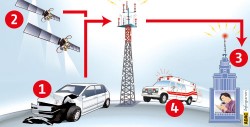Today the European Parliament voted in favour of eCall regulation which requires all new cars be equipped with eCall technology from April 2018. In the event of a serious accident, eCall automatically dials 112 – Europe’s single emergency number.
It communicates the vehicle’s exact location to emergency services, the time of incident and the direction of travel (most important on motorways), even if the driver is unconscious or unable to make a phone call. An eCall can also be triggered manually by pushing a button in the car, for example by a witness of a serious accident. eCall will transmit the data that is absolutely necessary in case of accident. Information only leaves the car in the event of a severe accident and is not stored any longer than necessary.
The Commission estimates that, once the system is fully implemented, eCall could save hundreds of lives every year and help injured people quicker.
The European Commission proposed the eCall regulation in June 2013.The text approved by the Parliament still needs to be published in the Official Journal of the European Union and will enter into force 20 days after.
Background
The EU supported the development of eCall through first the eMerge project and later its deployment through the HeERO that developed the pan-European in-vehicle emergency call service – “eCall” – based on 112, the common European Emergency number. During four years (HeERO phase 1 in 2011-2013 & HeERO phase 2 in 2013-2014), 15 countries carried out the start-up of an interoperable and harmonized emergency call system.